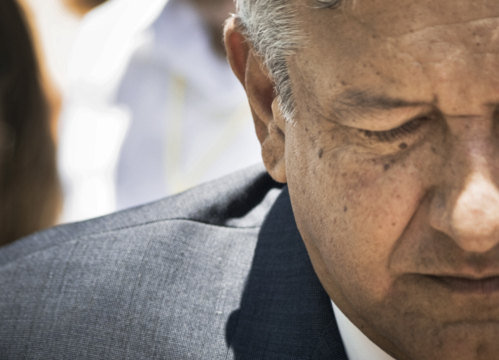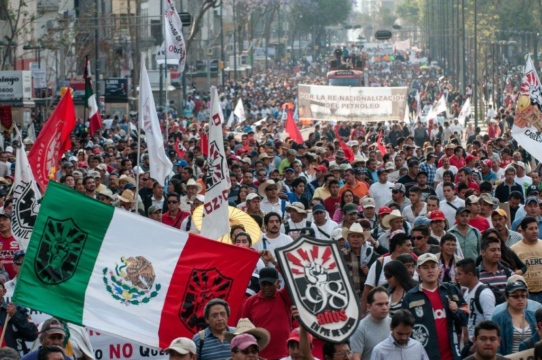Mexico’s gross domestic product remained flat in the second quarter as compared to the first, a level that was nearer to a recession than previously thought, the national statistics institute announced in August. Is Mexico slipping into a recession? What are the biggest headwinds that the country’s economy faces? Are the central bank and President Andrés Manuel López Obrador taking the right actions to spur the economy?
Jaana Remes, partner, and Kevin Sullivan, fellow, at the McKinsey Global Institute: “Mexico’s flat growth this year comes as no surprise to long-term Mexico watchers: once again, hopes of change have turned into disappointing reality. GDP growth may even fall below population growth this year, and most Mexicans won’t see gains in their living standards. For companies, stagnant incomes imply slow demand growth, dampening appetite for investment. To end this vicious cycle, the two ‘missing middles’ of Mexico’s economy will need to be addressed: the relative lack of dynamic mid-size companies and of a prospering middle class. With few companies that have more than $50 million in annual revenue, Mexico’s economy lacks the dynamism to create well-paying jobs for most Mexicans. Jobs tend to pool in small, unproductive and often informal businesses, reducing upward wage pressure even for industries that have become globally competitive in Mexico’s open economy. There is no silver bullet solution to these missing middles. More inclusive growth will require more participatory markets in industry, finance, labor and land, for example, and this will take time. Our research suggests that Mexico needs supply-side solutions to boost animal spirits of companies to invest, coupled with policies that boost demand by incentivizing expansion of more skilled jobs and rising wages. For service sectors, digital adoption offers an opportunity for productivity gains that are already being realized in the region (and the Mexican government itself). Despite trade uncertainty, Mexico can build on its world-class export strengths. Business and government will need to pull together a collaborative national plan of digital infrastructure, deeper and greener export supply chains, talent development and security of wages and jobs that can sustain a middle class. Only then will reality stop disappointing the aspirations of millions of Mexicans.”
Pamela Starr, senior advisor at Monarch Global Strategies and associate professor at the University of Southern California: “The Mexican economy is poised for a mild recession, driven by declining industrial output and investment and reinforced by tight monetary and fiscal policies. Industrial production experienced a sharp across-the-board annual drop in May and June, due to a decline in both government and private sector investment. Real investment fell for the fourth consecutive month in May, its largest contraction since 2013, while a 21 percent drop in capital goods imports in June suggests a continuation of this trend. These figures reflect a number of external and domestic factors, but the one that stands out is weak investor confidence. According to the national statistics agency, it is at its lowest level since 2017. However, other measures paint a bleaker picture. The Bank of Mexico’s most recent poll of economic analysts registered fully 77 percent who said now was not a good time to invest in Mexico, and business executives point to paralysis driven by AMLO’s erratic decision-making process and the uncertainty it generates. In this context, AMLO’s insistence that the ‘Fourth Transformation’ cannot be achieved without the collaboration of a dynamic private sector does not resonate. What Mexico needs is a positive shock in the form of a policy statement from AMLO that revives private sector confidence in his administration. Recent indications that AMLO could be revising his petroleum policy to allow Pemex to enter into joint ventures with private firms and to reinitiate auctions for deepwater oil tracts, if true, would be a big step in the right direction.”
Wolfram F. Schaffler González, director of the Texas Center for Border Economic and Enterprise Development at Texas A&M International University: “International trade uncertainty is taking a toll on the Mexican economy, specifically because, for better or for worse, much of its trade is U.S.-centric, and if the United States enters a recession, the same can be expected for Mexico. U.S. Congress’ delay in approving the USMCA has presented some risks, but not enough to slow down Mexican exports, which have steadily grown over the past year. In addition to this, the U.S.-China tariff war can have unintended positive effects on the Mexican economy. When both factors are brought together, it seems less likely that Mexico will fall into a recession. However, when confronted with information that does not conform to the institutional narrative he is promoting, President López Obrador is known to stick to ‘the other data’ he often says he has. In this case, two quarters in a row of zero growth will certainly have his administration scurrying for either economic policy alternatives or a new storyline that disregards it as an anomaly or an untruth. Other factors also seem to undercut the fear of a recession. Among them are good unemployment and inflation figures, which are the best in the last two years (3.5 percent and 3.84 percent, respectively for the first six months of 2019). And during the same period, Mexico’s foreign direct investment grew 1.5 percent more than in 2018. Nonetheless, the risk of a recession in Mexico exists, because when the United States sneezes, Mexico catches a cold.”
Alfredo Coutiño, director for Latin America at Moody’s Analytics: “Mexico’s economy is suffering a deceleration that is deeper than expected, more as a result of domestic factors and less of external shocks. The economy only grew 0.2 percent in the first half of the year, with the first quarter experiencing a contraction of 0.3 percent. On the domestic side, the economy is facing the traditional deceleration that is typical of the first year of each new administration, which is aggravated by the fiscal austerity self-imposed by the López Obrador government. Additionally, actions the government has taken during its first year have affected investor sentiment and consumer confidence. Among those actions are: the cancellation of infrastructure projects, reversion of the education reform, revision of the energy reform and threats against independent institutions. On the external front, the economy suffered the threat of cancellation of NAFTA and the U.S. government’s imposition of tariffs on some of its exports. The uncertainty surrounding the agony of Brexit and market fears about the possibility of a global recession have affected financial markets and introduced a persistent uncertainty. All this together has produced a reticence in investment and a delay in consumer decisions, thus amplifying the economy’s traditional slowdown generated by the political transition every six years. Given the above-target inflation over the past two years, monetary policy turned restrictive. However, the recent disinflation generated by the economy’s plunge has opened space for the central bank to start a monetary easing cycle. President López Obrador’s actions have already affected investor sentiment, and his persistent neglect of growth as a necessary condition for development has generated a lack of proactive policies to help the economy overcome its prolonged weakness. Despite López Obrador’s denigration of neoliberalism, 2019 will not be different for the economy under his government, compared with previous neoliberal administrations.”
 The Latin America Advisor features Q&A from leaders in politics, economics, and finance every business day. It is available to members of the Dialogue’s Corporate Program and others by subscription.
The Latin America Advisor features Q&A from leaders in politics, economics, and finance every business day. It is available to members of the Dialogue’s Corporate Program and others by subscription.























